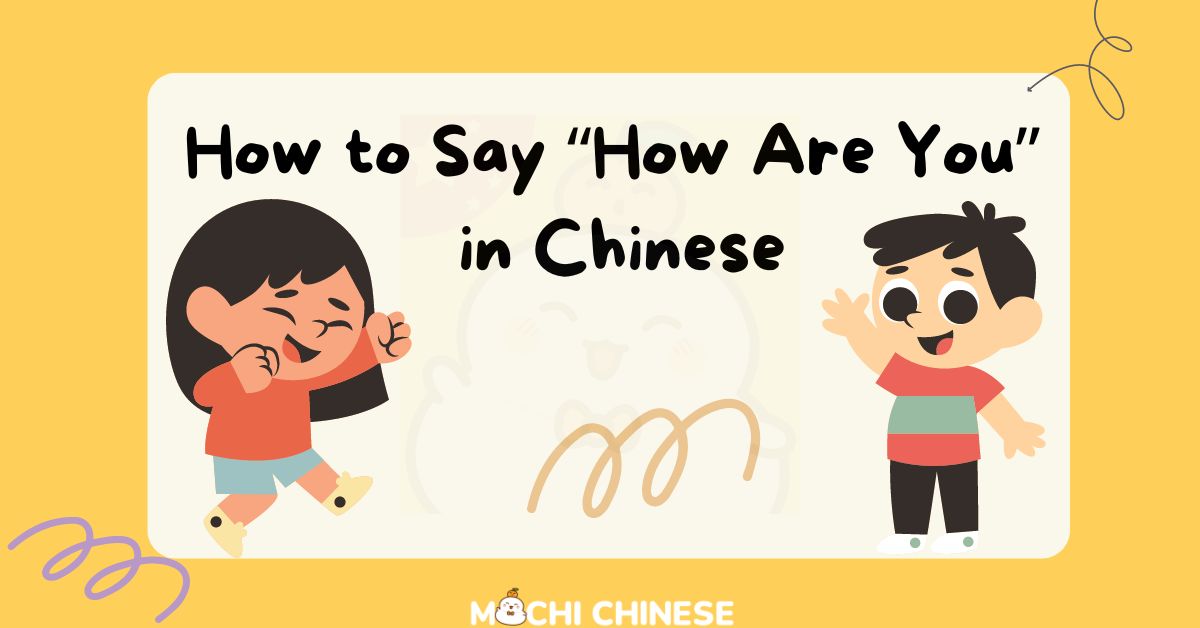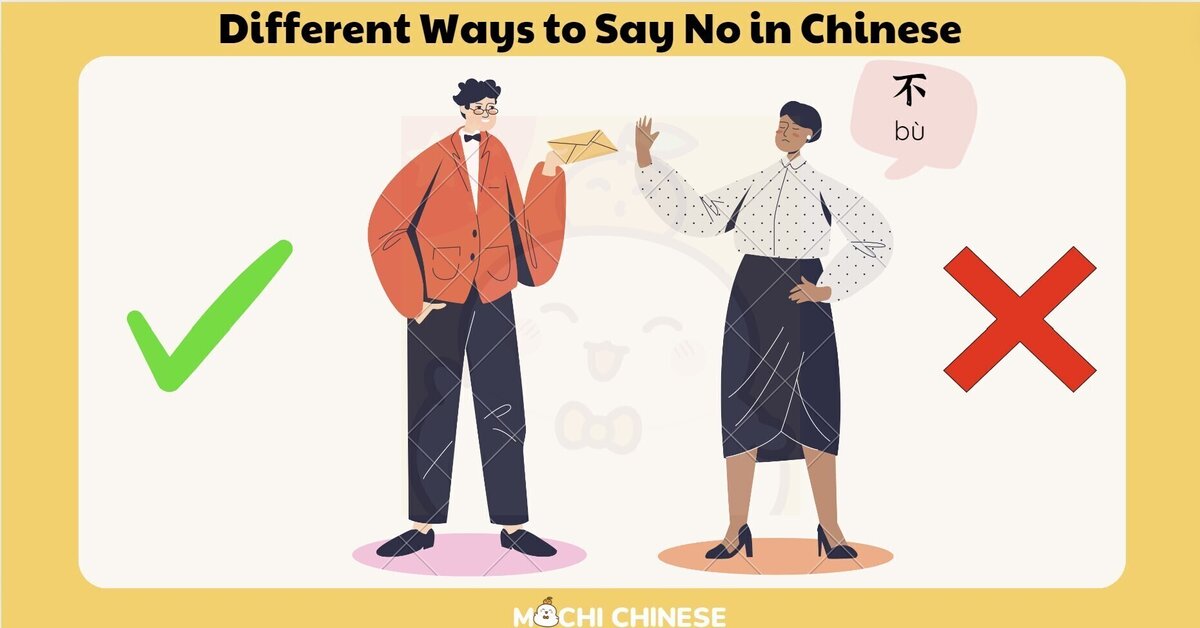Apologizing is a universal gesture that transcends language barriers, but each culture has its own nuances and customs when it comes to expressing remorse. In Chinese culture, apologies carry significant weight, reflecting values such as humility, respect, and maintaining harmonious relationships. Whether you’re a beginner or looking to refine your language skills, understanding the best ways to apologize in Chinese and respond to apologies is essential for navigating social interactions smoothly.
Basic Phrases for Apologizing in Chinese
“对不起 (Duìbuqǐ)” – A Universal Apology
“对不起” (Duìbuqǐ) is perhaps the most commonly known phrase for apologizing in Chinese. It is akin to saying “I’m sorry” in English and can be used in a variety of situations.
When to Use
Use “对不起” (Duìbuqǐ) in situations where you need to express a sincere apology, whether the offense is minor or more significant. It’s versatile and appropriate for both formal and informal settings.
“不好意思 (Bù hǎoyìsi)” – A Lighter Apology for Minor Inconveniences
“不好意思” (Bù hǎoyìsi) translates to “sorry” or “excuse me” and is used for less serious situations, like bumping into someone or interrupting a conversation.
When to Use
Use “不好意思” (Bù hǎoyìsi) when the offense is minor and doesn’t warrant a formal apology. It’s perfect for everyday situations where you want to acknowledge a small mistake or inconvenience.
“抱歉 (Bàoqiàn)” – A More Formal Apology
“抱歉” (Bàoqiàn) is a more formal way to apologize and can be used in professional or serious contexts.
When to Use
Use “抱歉” (Bàoqiàn) in formal settings or when the situation requires a more serious acknowledgement of fault. It’s suitable for work-related apologies or significant misunderstandings.
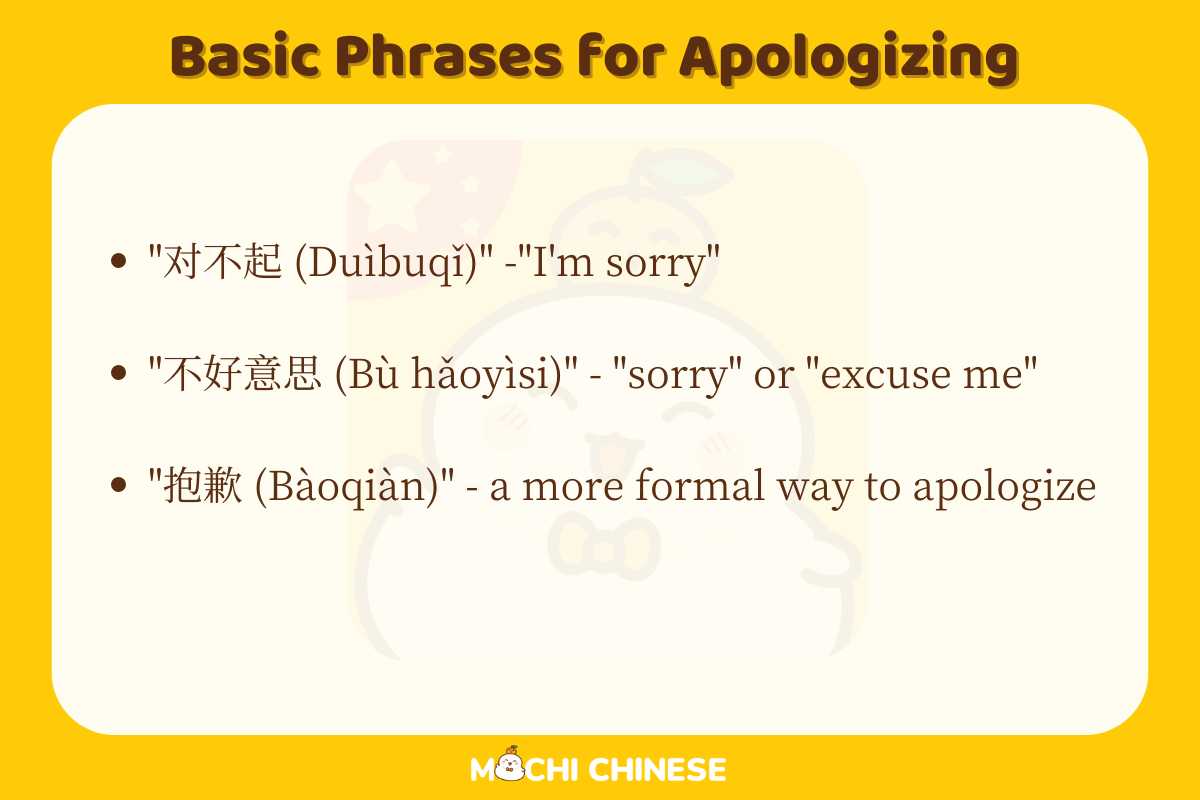
Other Useful Apology Phrases
“对不住 (Duìbùzhù)” – Sincere Apology for Deep Regret
“对不住” (Duìbùzhù) expresses a deep sense of regret and is used when you feel genuinely sorry.
When to Use
Use this phrase when you have caused considerable harm or inconvenience and want to show heartfelt remorse.
“请原谅 (Qǐng yuánliàng)” – Requesting Forgiveness
“请原谅” (Qǐng yuánliàng) translates to “please forgive me” and is a humble way to ask for someone’s forgiveness.
When to Use
Use this phrase when seeking forgiveness for a mistake, showing that you acknowledge your fault and seek their pardon.
“过意不去 (Guò yì bú qù)” – Feeling Guilty
“过意不去” (Guò yì bú qù) is a way to express that you feel bad about something you’ve done.
When to Use
Use this when you feel remorseful and want to convey that you are troubled by your actions.
“失礼了 (Shī lǐ le)” – Apologizing for Rudeness
“失礼了” (Shī lǐ le) is used to apologize for being rude or impolite.
When to Use
Use this in formal situations where you’ve breached etiquette or manners.
“打扰了 (Dǎrǎo le)” – Sorry for the Disturbance
“打扰了” (Dǎrǎo le) is a polite way to apologize for disturbing or bothering someone.
When to Use
Use this when you need to interrupt someone or intrude on their time.
“麻烦你了 (Máfan nǐ le)” – Sorry for the Trouble
“麻烦你了” (Máfan nǐ le) is used to apologize for causing inconvenience or trouble.
When to Use
Use this when you’ve caused someone extra work or inconvenience.
“让你久等了 (Ràng nǐ jiǔ děng le)” – Apologizing for Making Someone Wait
“让你久等了” (Ràng nǐ jiǔ děng le) is specifically for apologizing for making someone wait.
When to Use
Use this phrase when you’re late and someone has been waiting for you.
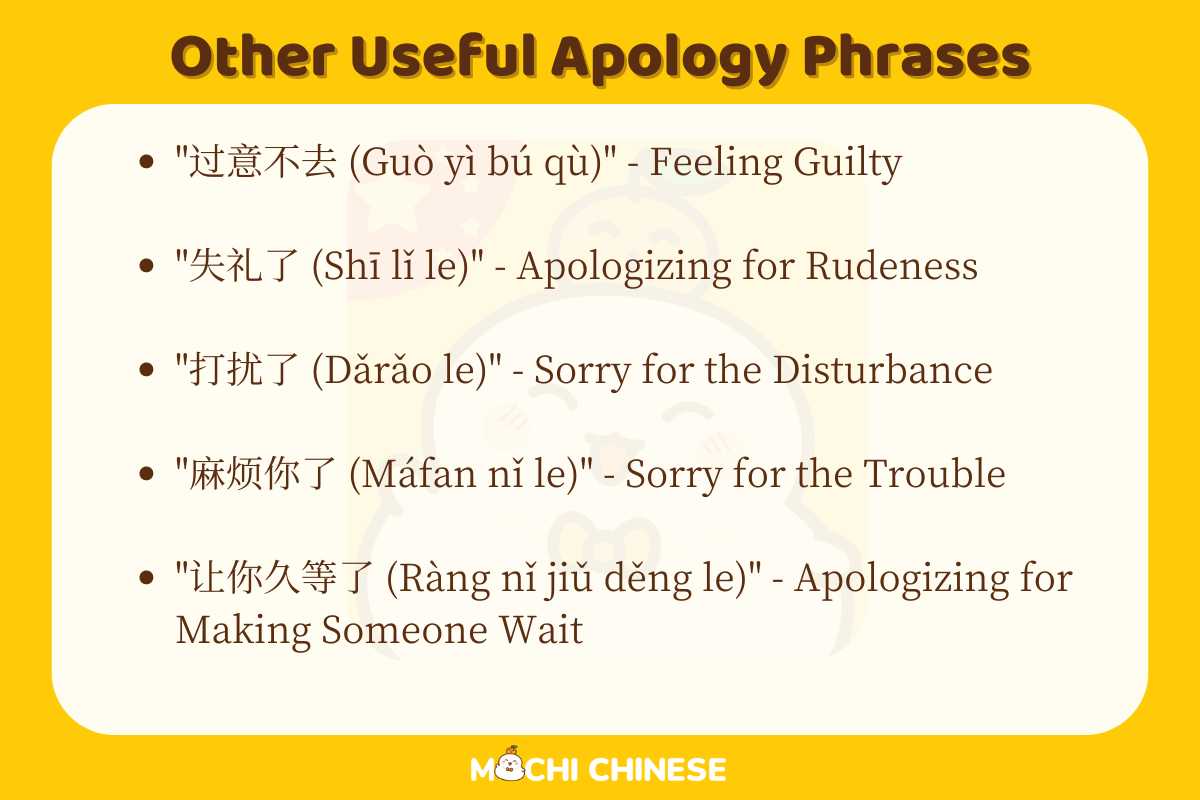
Understanding the “Sorry”
Differences Between Formal and Informal Settings
In Chinese culture, the context in which you apologize matters. In formal settings, such as professional environments or with elders, using more formal language like “抱歉” is appropriate to convey respect. In informal settings, among friends or peers, a lighter apology like “不好意思” may be more suitable to maintain a casual atmosphere.
How Severity of the Situation Affects the Choice of Words
The severity of the situation also influences the choice of apology phrase. For minor incidents, such as arriving late to a casual gathering, “不好意思” suffices. However, for more serious offenses, such as causing harm or disappointment, a more formal apology like “抱歉” is necessary to convey sincerity and remorse.
Cultural Insights: The Role of Face (面子, Miànzi) and Respect
In Chinese culture, preserving “面子” (miànzi) is crucial. Apologizing publicly or admitting fault can be perceived as losing face, both for oneself and others involved. Therefore, apologies are often made with tact and humility, focusing on reconciliation rather than assigning blame.
How to Respond to an Apology in Chinese
Responding to an apology graciously is just as important as making the apology itself. Knowing how to appropriately accept an apology in Chinese can further help maintain harmony and show respect.
Accepting an Apology
“没关系 (Méiguānxi)” – It’s Okay
“没关系” (Méiguānxi) is a common phrase used to tell someone that it’s okay and that there are no hard feelings.
When to Use
Use “没关系” (Méiguānxi) in casual settings when the mistake is minor and you want to put the other person at ease.
“不用担心 (Bùyòng dānxīn)” – Don’t Worry About It
“Bùyòng dānxīn” (不用担心) translates to “don’t worry about it” and can be used to reassure the person apologizing that their mistake is not a big deal.
When to Use
Use this phrase when you want to alleviate the worry of the person apologizing, especially if they seem particularly concerned about their mistake.
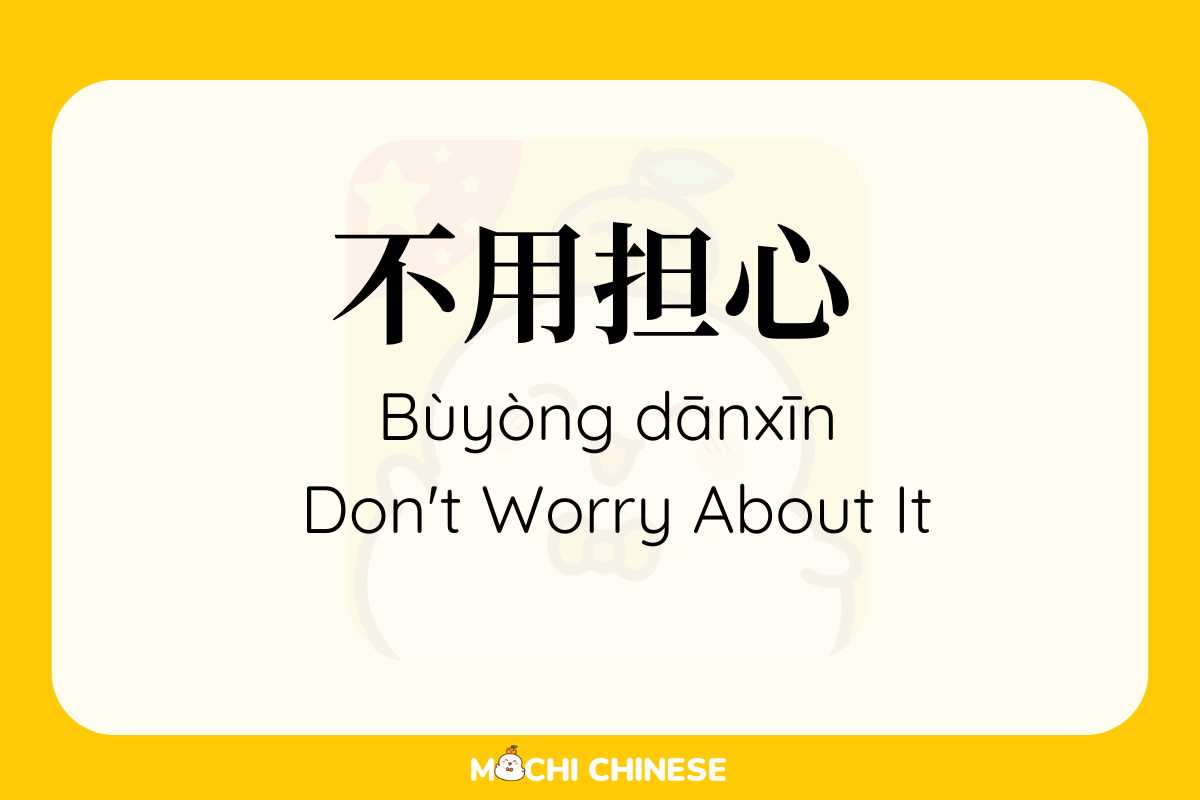
Expressing Forgiveness
“我原谅你了 (Wǒ yuánliàng nǐ le)” – I Forgive You
“我原谅你了” (Wǒ yuánliàng nǐ le) is a direct way to express forgiveness.
When to Use
Use this phrase in situations where a more serious apology has been made, and you want to formally acknowledge your forgiveness.
Understanding the Emotional Weight Behind Forgiveness in Chinese Culture
Forgiveness in Chinese culture is often a deep and meaningful act. When someone says “我原谅你了” (Wǒ yuánliàng nǐ le), it signifies a sincere and heartfelt decision to move past the mistake. Forgiveness not only mends relationships but also restores the social harmony that is highly valued in Chinese society.
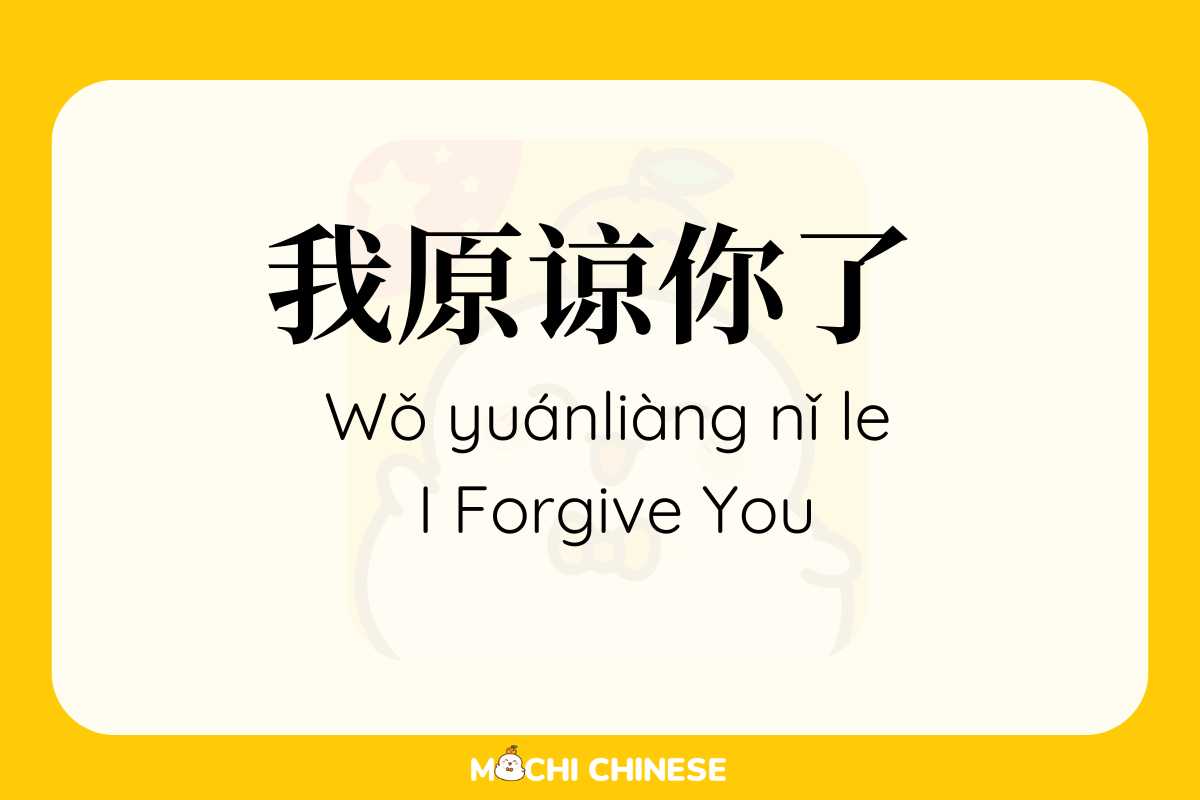
Practical Examples
Apologizing for Being Late
Situation: You are late for a meeting with a friend.
Dialogue:
- You: 对不起,我迟到了。(Duìbuqǐ, wǒ chídào le.) – I’m sorry, I’m late.
- Friend: 没关系,我也刚到。(Méiguānxi, wǒ yě gāng dào.) – It’s okay, I just arrived too.
Key Phrases:
- 对不起 (Duìbuqǐ) – I’m sorry
- 我迟到了 (wǒ chídào le) – I’m late
- 没关系 (Méiguānxi) – It’s okay
Responding to an Apology at Work
Situation: A colleague apologizes for missing a deadline.
Dialogue:
- Colleague: 抱歉,我没有按时完成。(Bàoqiàn, wǒ méiyǒu ànshí wánchéng.) – Sorry, I didn’t finish on time.
- You: 没关系,我们还有时间。(Méiguānxi, wǒmen hái yǒu shíjiān.) – It’s okay, we still have time.
Key Phrases:
- 抱歉 (Bàoqiàn) – Sorry
- 没关系 (Méiguānxi) – It’s okay
- 我们还有时间 (wǒmen hái yǒu shíjiān) – We still have time
Apologizing for a Misunderstanding Among Friends
Situation: You misunderstood a friend’s comment.
Dialogue:
- You: 对不起,我误会了你的意思。(Duìbuqǐ, wǒ wùhuì le nǐ de yìsi.) – I’m sorry, I misunderstood you.
- Friend: 没关系,这种事常有。(Méiguānxi, zhè zhǒng shì cháng yǒu.) – It’s okay, it happens often.
Key Phrases:
- 我误会了 (wǒ wùhuì le) – I misunderstood
- 你的意思 (nǐ de yìsi) – Your meaning
- 这种事常有 (zhè zhǒng shì cháng yǒu) – It happens often
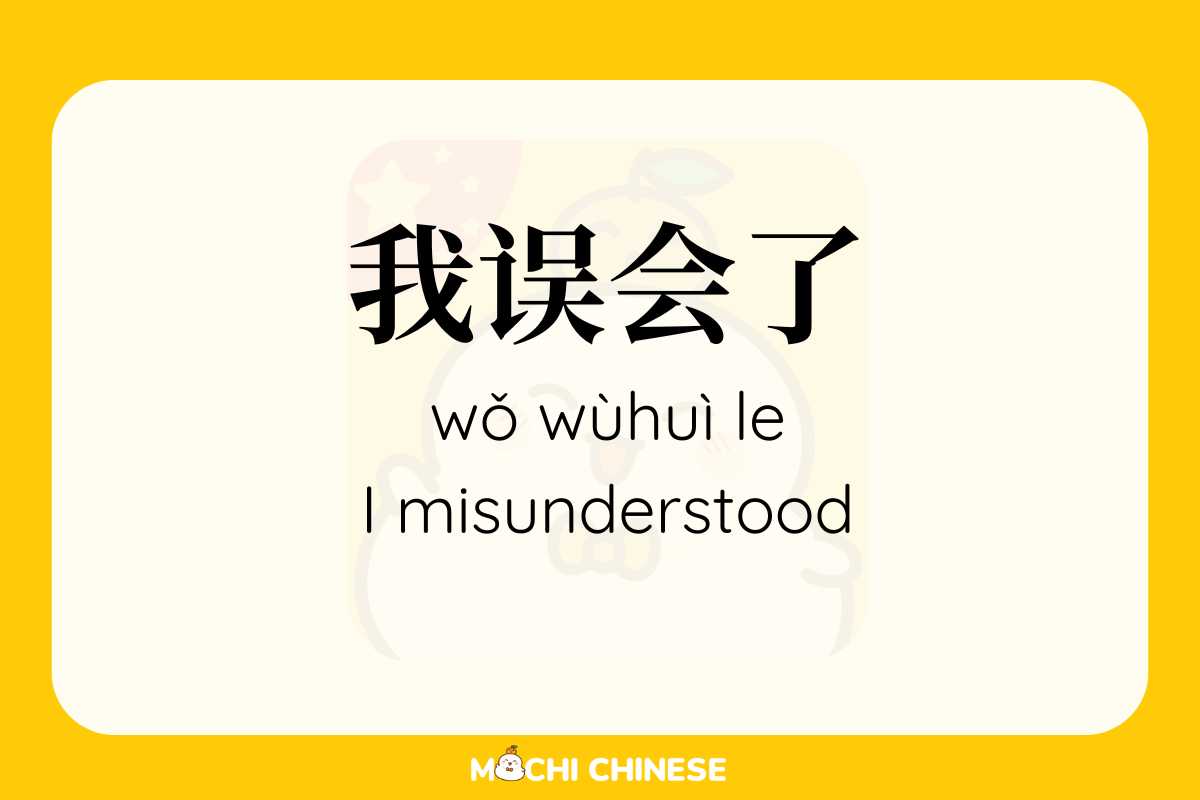
Additional Tips
How Tone and Body Language Affect Apologies
In addition to choosing the right words, your tone and body language convey sincerity and remorse. Maintain a respectful tone and make eye contact when apologizing, showing that you are genuinely contrite. Avoid appearing defensive or insincere, as it may undermine the effectiveness of your apology.
Why Sincerity is Crucial in Making Apologies
Sincerity is the cornerstone of a meaningful apology. Regardless of the words you use, genuine remorse and a willingness to make amends are essential for repairing relationships and restoring trust. Avoid making empty apologies or shifting blame, as they can further strain the situation and hinder reconciliation.
Learning from Common Mistakes in Using Apology Phrases
Mistakes are an inevitable part of learning a new language, but acknowledging and learning from them is key to improvement. Reflect on past apologies and consider how they were received. Pay attention to cultural nuances and feedback from native speakers to refine your language skills and become more proficient in expressing apologies.
Conclusion
Apologizing in Chinese is more than just saying sorry; it’s about humility, respect, and maintaining harmonious relationships. By mastering the appropriate phrases and understanding cultural nuances, you can navigate social interactions with confidence and grace. Remember to practice regularly, as fluency in apologies will not only enrich your language skills but also deepen your connections with others. So, the next time you find yourself in a situation that calls for an apology, speak from the heart and embrace the opportunity to mend fences and foster understanding.
Recommendation: Mochi Chinese App
This app focuses on joyful learning experiences and helps you memorize 1000 Chinese words in just one month. It features bright and friendly design, interactive lessons, and a special feature called “Golden Time” that reminds you to review vocabulary right before you forget it. You can download it for free from the Google Play Store, App Store, or Web version.




